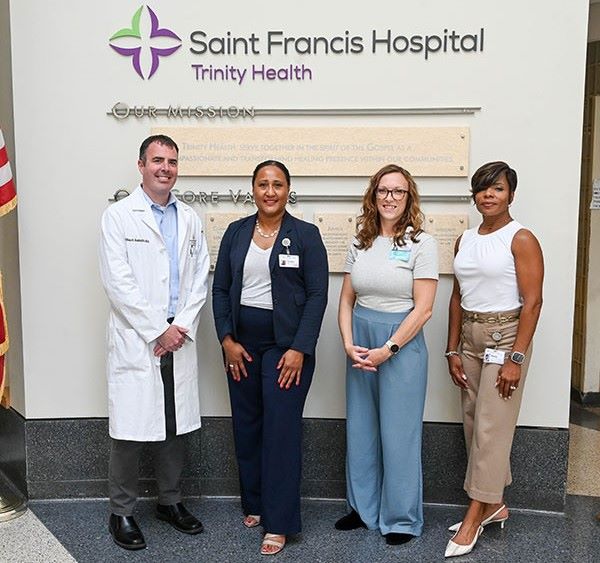THOfNE Among Group to Develop National Toolkit for Care of Patients with Opioid and Stimulant Use Disorders
August 25, 2025Categories: Awards and Recognition
The American Hospital Association (AHA) has released a new toolkit to improve continuity of care for patients with opioid use disorder (OUD) and stimulant use disorders (StUD). Developed with support from the Centers for Disease Control and Prevention and in partnership with three clinical teams including Trinity Health Of New England, the toolkit offers practices to implement across the care continuum. Its goal is to improve access and sustained engagement in care, emphasizing transitional periods that are vital to successful recovery.
In addition to Trinity Health Of New England, Oregon Health & Science University, and the University of Kentucky received grants from AHA Health Research & Education Trust (HRET) to design and implement an initiative aimed at improving linkage of OUD and StUD across multiple care settings, including inpatient care, primary care, and pharmacies, inclusive of community-based support services.

Among the Trinity Health Of New England team that participated in initiative were Dr. William Rabitaille, Carolyn Alessi, Tera Falcetti and Sheila Coleman.
The three partner organizations were selected for their unique approach to addressing OUD and StUD. Trinity Health Of New England was chosen for its implementation of Peer Support Specialists (PSS) who are integrated into the care team and work to interrupt the cycle of readmission. Upon discharge from treatment, patients are connected with rehabilitation centers, outpatient programs and clinics. PSS ensure that patients have appointments scheduled and ensure continuity of care to prevent lapses in treatment. As part of the care team, PSS assist in providing wraparound support for barriers like transportation, housing instability, and insurance issues, ensuring patients remain engaged in their recovery.
“Internal, interdisciplinary collaboration was key to our success especially as we built a model that leverages Community Health and Well-Being’s approach to integrated peer-to-peer support within the inpatient care team,” said Carolyn Alessi, MBA, Regional Director, Community Health and Well-Being & Curtis D. Robinson Center for Health Equity. “Each member of the team brought thoughtfulness and insight to identifying gaps, addressing systems barriers, and surfacing meaningful opportunities for improvement.”
Together the teams developed the toolkit using best practices identified through a literature review and the evidence-informed practices being used within their organizations. The toolkit offers leading practices as a framework for action across inpatient, primary care and pharmacy settings, with toolkits provided for each setting.
Trinity Health Of New England’s pilot program took place at Saint Francis Hospital and Mount Sinai Hospital in Hartford. The program will be replicated at Trinity Health Of New England’s other regional hospitals.
The Trinity Health Of New England team consisted of Alessi, Saeed Ahmed, MD, FAPA, FASAM, Chair, Behavioral Health; William Rabitaille, MD, FACP, Chief, Primary Care; Tera Falcetti, PharmD, BCPS, BCACP, Director of Pharmacy Operations; Sheeima Paramatmuni, MD, Inpatient Psychiatry; and Sheila Coleman, DSW, LMSW, Director, Programs, Community Health and Well-Being.
